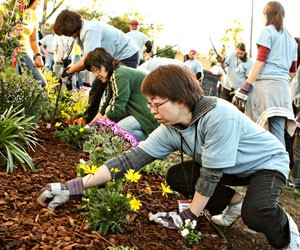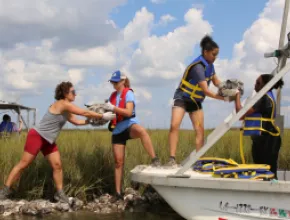Take yourself back about 10 years and imagine sitting in an event-planning meeting where someone brings up the term ‘corporate social responsibility.’ Chances are, that person would have been met with a boardroom full of blank stares. Instead, team building was all the rage—the more zip lines and ropes courses the better. But as the economy went south and public scrutiny around lavish corporate meetings intensified, companies looked for activity alternatives.
It’s not that socially responsible activities weren’t being done in concert with meetings more than a decade ago. They were—the buzz phrase just hadn’t been invented yet. Today, corporations and associations are touting their community activities and often incorporating them as mandatory components in a meeting’s agenda.
Jennifer Miller, general manager of the San Diego and Los Angeles locations of Access Destination Services, a destination management company, says she saw CSR programs really bust out in 2009, after first bubbling up in 2007 and 2008.
“We almost survived as a company on CSR programs alone in 2009 and 2010,” she says. “Times were tough, but we were calling groups and asking them not to cancel meetings because if they did, they wouldn’t have been able to help people in need with their community programs. It got so big that we had to we add two people to specialize solely in CSR in our company, and it’s been going strong ever since.”
Groups Making A Difference
Corporate social responsibility programs come in all shapes and sizes. A group can set up a bike building workshop in a ballroom for inner city youth, volunteer to paint houses for Habitat for Humanity…you name it. But as Miller explains, groups more and more want to push the envelope.
“I’m seeing groups want to dive into local organizations and really get up close and personal with the people they are helping,” she says.
For example, Miller and one of her client organizations recently set aside a day during a meeting to help refurbish a military family’s home. About 75 meeting delegates rotated through the site and facilitated work ranging from fixing screen doors and replacing blankets to landscaping outside areas.
“The family wasn’t there; we sent them away for a day,” she says. “The project was really based on the television show Extreme Home Makeover, except that we didn’t tear down the whole house. When the family came back, everything was done.”
Miller has executed the same project for other military families and says meeting attendees really love to get involved.
Another project in the pipeline is with a group that wants to redo an entire pre-school.
“They are going to put in new technology supplies and it will be a big project, but this group is really passionate about it,” Miller says. “I see more groups looking to make a huge impact.” PageBreak
Bureaus Pitch In
Convention and visitors bureaus are also finding ways to help meeting planners create big impact in the realm of CSR. Down in Orlando, Florida, Visit Orlando steers groups to local non-profit Clean the World.
“Clean the World takes unused or partially used soaps and makes them usable; then they ship soap to countries in need,” says bureau president and CEO Gary C. Sain. “It is a great organization and we like to partner with them for CSR programs,” he says.
Participating meeting delegates don work clothes and head over to the Clean the World factory to sort soaps.
“They help in cleaning the soap, packaging it and going through the whole process,” Sain says. “We’ve already done this with several dozen groups and I can see us doing it with 100 more next year. The reaction from participants is always positive.”
Almost 800 miles north in Virginia Beach, Va., Teri Wiley, CMP, senior services manager at the Virginia Beach CVB, says her bureau is deeply involved in CSR.
“We’ve done book drives at ASAE and our last FAM was themed ‘One Beach, One World’ where we put together toiletries kits for a homeless shelter,” she says. “It was a really great program. The homeless shelter accepted them and gave them out to those in need on the same day we assembled them.”
Wiley says the bureau is happy to get inventive when it comes to budget-conscious groups that want to incorporate a CSR component.
“Recently we went to a convention where we put out postcards for military personnel,” she says. “Everyone wrote words of thanks on the postcards and we shipped them out before troops were deployed. It was a great initiative, and it didn’t cost the group anything.” PageBreak
At Visit Tucson, the Arizona city’s CVB, director of convention sales Graeme Hughes says more than 40 percent of groups that book business through the organization want to incorporate a CSR component into their event. “It has really increased over the last 18 months,” he says.
As a result, Visit Tucson has found ways to help planners add this service element to their meetings. “Because of the frequency of requests, we’ve really streamlined the process so it is easy to book those types of programs through us.”
One popular program is to work with Tucson Clean & Beautiful, a non-profit entity that works to maintain gateway roads from the airport and into downtown.
“A lot of groups will want to go out and clean up as part of their project,” Hughes says. “Also, we have done a lot of programs that include the removal of buffalo grass, which is an invasive weed grass.”
Passion for CSR programs is rampant in Milwaukee, Wisc. Too. As Brent Foerster, vice president of marketing for Visit Milwaukee says, the bureau is heavily dedicated to giving back to the community.
“We will go to trade shows and sponsor receptions where planers can come over and help build bikes for local youth,” he says. “Just this year at ASAE we aimed to donate $5,000 for the local Boys & Girls Club, so we donated $20 for anyone who stopped by our booth and $50 for anyone who brought us an RFP. It was a fun way to get attention for the bureau and also raise money for charity.”
A Good Future
CSR programs may be hot right now, but will the trend last?
“Absolutely,” says Miller. “I think the offerings will be greater in the future and I think groups will be pushed to develop more programs. There will never be a shortage of people who need help, so I think these programs are here to stay.”
Katie Morell is a freelance writer and former Meetings Focus editor. For more information, visit www.katiemorell.com.






